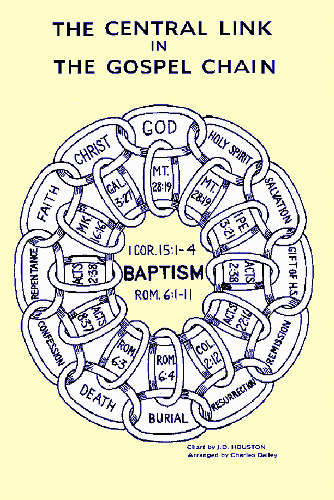A Short History
of Immersion

A Short History
| 
|
In the photo, Jim Newman is about to immerse Roy in the Carribean.The original Greek word "baptize" meant to dip, plunge, immerse in water. It had this meaning when Christ was here on earth, and it has never changed.
Webster's New Collegiate Dictionary: "Baptize . . . from Greek baptizein, from baptein to dip in water."Century Dictionary (7 volumes): "Baptize . . . dip in water."
The Encyclopedia Dictionary (7 Volumes): "Baptize . . . to dip in or under water."
Chamber's English Dictionary: "Baptize . . . to dip in water."
The Library Dictionary: "Baptism . . . to dip in water."
Household Dictionary: "Baptism . . . to dip in water."
Encyclopedia Americana: "Baptism (that is, dipping, immersing, from the Greek baptizo) . . . In the time of the apostles, the form of baptism was very simple. The person to be baptized was dipped in a river or vessel with the words which Christ had ordered . . ."New International Encyclopedia: "Baptism . . . was originally by immersion. The candidates used to descend into fonts or streams, or rivers, and sink beneath the waters under the pressure of the hands of the minister."
Chamber's Encyclopedia: "Baptism . . . It is, however, indisputable that at a very early period the ordinary mode of baptism was by immersion . . ."
Nelson Complete Encyclopedia (1937, 24 volumes): "There is little doubt that the original practice was immersion . . ."
Blunt's Theological Dictionary: "That immersion was the ordinary mode of baptizing in the primitive church is unquestionable."Catholic Dictionary (by Wm. E. Addis, 1934): "Baptism . . . In apostolic times the body of the baptized person was immersed, for St. Paul looks on this immersion as typifying burial with Christ, and speaks of baptism as a bath . . . for even St. Thomas in the 13th century, speaks of baptism by immersion as the common practice of his time."
The Catholic Encyclopedia Dictionary (1941): "Baptism . . . the act of immersing or washing."
Roman Catholic Ecclesiastical Dictionary (by Rev. John Thein, 1900): "Baptism . . . The word baptism is a Greek word which signifies ablution or immersion. This was the manner of baptizing in the primitive church "
Hook's Church Dictionary: "In performing the ceremony of baptism, the usual custom was to immerse and dip the whole body."
Schaff-Herzog Encyclopedia of Religious Knowledge: "Baptism . . . Original Forms . . . It is an attractive theory, supported by Cyprian's express statement, that the Jews and the Gentiles in the apostles' time had a different manner of baptizing; that among the Jewish Christians a single immersion was the rule, in the name of Christ alone, on the analogy of the Jewish proselyte baptism, while the threefold immersion in the threefold name, which has its counterpoint in the heathen lustrations was the rule among the Gentile Christians."The Concordia Encyclopedia (1927): "Baptism . . . Nevertheless, it is held by historians that immersion wholly in water was the prevailing mode of the first century."
The Catholic Encyclopedia: "Baptism . . . The word baptism derived from the Greek word means to wash or to immerse. It signifies, therefore, that laying is the essential idea of the sacrament . . . The most ancient form usually employed was unquestionably immersion. In the Latin (Catholic) church, immersion seems to have prevailed until the twelfth century."
Thayer: Greek-English Lexicon of the New Testament: "Baptizo . . . Properly, to dip repeatedly, to immerse, to submerge."
Hermas (in the Commands of Hermas, Book 2, Com. 4, C. 3): "And I said to him, 'I have even now heard from certain teachers, that there is no other repentance besides that of baptism; when we go down into the water, and receive the forgiveness of sins; and after that we should sin no more, but live in purity!' And he said to me-' Thou host been rightly informed'."Tertullian, (On Baptism, Chapter 7): "Thus, too, in our ease, the unction runs carnally, (such as on the body), but profits spiritually; in the same way as the act of baptism itself too is carnal, in that we are plunged in water, but the effect is spiritual, in that we are freed from sins."
Council of Nice, A.D. 325: "He who is baptized descends indeed, obnoxious to sins, and held with the corruptions of slavery; but he ascends free from the slavery of sins, a son of God, heir-yea, co-heir-with Christ, having put on Christ, as it is written, 'As many of you as were baptized into Christ have put on Christ'."Fourth Council of Toledo, A.D. 633: "For shunning the schism (trine immersion) or the use of an heretical practice, we observe a single immersion in baptism . . . For the immersion in the waters is a descent, as it were into the grave; and, again, the emersion from the waters is a resurrection."
Council of Worms, A.D. 868: "While some priests baptized with three immersions, and others with one, a schism was raised, endangering the unity of the church "
Council of Tribur, A.D. 895: "Trine immersion is an imitation of the three days burial, and the rising again out of the water is an image of Christ rising from the grave."
The Synod of Cologne, A.D. 1280: "He who baptizes, when he immerses the candidate in water, shall neither add to the words, or take away from them, or change them."
Have you noted that first trine immersion was called an "heretical practice," and then accepted.
(From Twentieth Century Christian, 1962)John Calvin, Presbyterian: "The word baptize signifies to immerse. It is certain that immersion was the practice of the primitive church."
Martin Luther, Lutheran: "Baptism is a Greek word and may be translated immerse. I would have those who are to be baptized to be altogether dipped."
John Wesley, Methodist: "Buried with him in baptism-alluding to the ancient manner of baptizing by immersion."
Wall, Episcopalian: "Immersion was in all probability the way in which our blessed Savior, and for certain the way by which the ancient Christians received their baptism."
Brenner, Catholic: "For thirteen hundred years was baptism an immersion of the person under water."
Macknight, Presbyterian: "In baptism the baptized person is buried under the water. Christ submitted to be baptized, that is, to be buried under water."
Whitfield, Methodist: "It is certain that the word of our text, Romans 6:4, alludes to the manner of baptizing by immersion."
Acts 8:36: ". . . they came unto a certain water . . ." It is only natural that a person who intended to be immersed must come to enough water to do so. Never do we find a single case in the New Testament of water being brought to a person who was going to be baptized.Acts 8:38: ". . . and they both went down into the water . . ." It is necessary for immersion that both the one to be baptized and the one doing the baptizing go down into the water. This would not be necessary in sprinkling or pouring.
Acts 8:39: ". . . they came up out of the water . . ." Both must come up out of the water once having gone into the water. This would not be necessary in the case of sprinkling or pouring.
Romans 6:4: ". . . buried therefore with him by baptism into death . . ."
Colossians 2:12: ". . . buried with him in baptism, in which you were also raised with him . . ." Baptism is described in these two verses as a burial. When something is buried it is completely covered or submerged.
Only immersion can fit the description of a burial. One is not buried in baptism when water is sprinkled or poured over his head. Then too, only one who is buried in water can be raised up out of it. No person can be raised from a few drops of water.
In the study of the many other examples to be found in the New Testament we find that those who were baptized were immersed. Much water was needed, going down into the water and coming up out of the water, is very evident. There can be no doubt whatsoever that the baptism of the New Testament is immersion.
Acts 10:48: We find that Peter commanded people to be baptized, for he ".... commanded them to be baptized in the name of Jesus Christ." We also find Peter preaching for the first time, after the establishment of the church, to those who had crucified Christ. These Jews from all nations were cut to the heart for what they had done to Christ Jesus. They asked the Apostles, "Brethren, what shall we do?" We find that Peter said to them, "Repent, and be baptized every one of you in the name of Jesus Christ for the forgiveness of your sins; and you shall receive the gift of the Holy Spirit." (Acts 2:37, 38).Now, go back over the statements of the early Christians, and other authorities, and note that these agree with the scriptures. You have the right to believe or reject what Jesus said: "He who believes and is baptized will be saved; but he who does not believe will be condemned." (Mark 16:16).
For further information on the necessify of immersion to be saved, consider the 13 panel presentation entitled ACTION.
